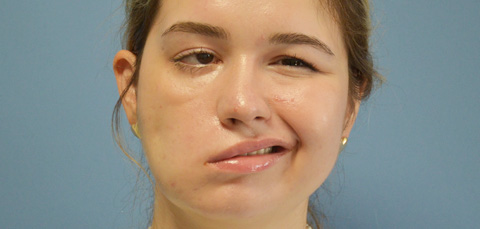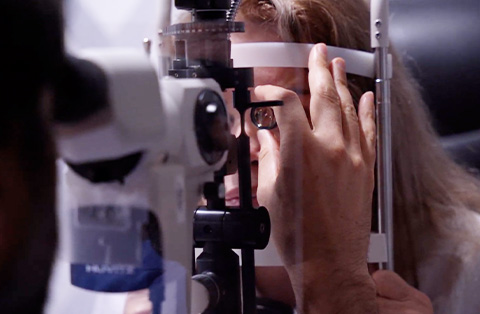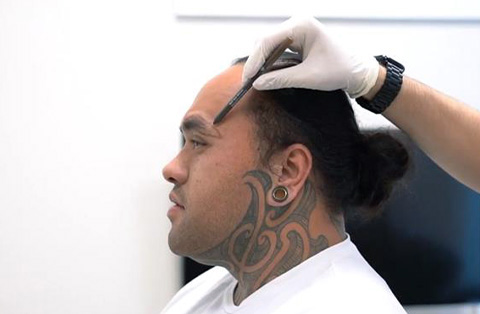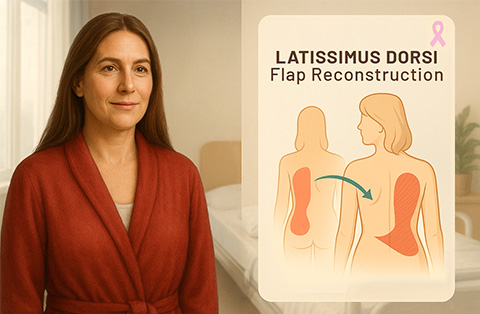Facial paralysis from ear infections can be alarming, but early diagnosis and treatment can prevent lasting damage. Learn the causes, risks, and best solutions to protect your nerve health and recovery.
What causes facial paralysis in ear infections?
Facial paralysis can occur as a complication of severe ear infections. The facial nerve, which controls movement in the face, runs through the temporal bone near the ear. When an infection spreads, it can affect this nerve, leading to weakness or paralysis.
Causes include:
Otitis media: A middle ear infection can cause inflammation and pressure on the facial nerve.
Mastoiditis: An untreated ear infection can spread to the mastoid bone, leading to nerve damage.
Cholesteatoma: An abnormal skin growth in the middle ear can erode structures and compress the facial nerve.
Herpes zoster oticus: The varicella-zoster virus can infect the ear, damaging the facial nerve.
Early treatment of ear infections can help prevent complications like facial paralysis.
How does the facial nerve relate to ear infections?
The facial nerve (cranial nerve VII) controls muscles for facial expressions, eye closure, and some sensory functions. It passes through the temporal bone, running close to the middle ear and mastoid region. Because of this location, ear infections can directly impact the nerve.
Key connections between the facial nerve and ear infections:
Anatomical proximity: The nerve travels through the facial canal in the temporal bone, making it vulnerable to inflammation and pressure from infections.
Inflammatory response: Infections like otitis media or mastoiditis can cause swelling, leading to nerve compression and dysfunction.
Direct viral or bacterial impact: Certain infections, such as herpes zoster oticus, can directly attack the nerve, causing pain and paralysis.
Damage to the facial nerve from an ear infection can lead to temporary or permanent weakness, emphasizing the importance of early medical intervention.
Can middle ear infections lead to facial paralysis?
Yes, middle ear infections (otitis media) can lead to facial paralysis, though it is rare. The infection causes inflammation and swelling in the middle ear, which can put pressure on the facial nerve. In severe cases, bacteria or toxins may directly damage the nerve.
How otitis media causes facial paralysis:
Swelling and pressure: Inflammation in the middle ear can compress the facial nerve, disrupting its function.
Spread of infection: If untreated, the infection can extend to the mastoid bone or facial canal, increasing the risk of nerve damage.
Cholesteatoma: A chronic ear infection may lead to abnormal tissue growth that erodes structures and affects the nerve.
Prompt treatment of ear infections with antibiotics or drainage procedures can help prevent facial paralysis and other complications.
What is the role of nerve injury in facial paralysis?
Nerve injury is the main cause of facial paralysis. The facial nerve controls muscle movement in the face, and any damage can lead to weakness or complete loss of function.
How nerve injury leads to facial paralysis:
Compression: Swelling from infection or inflammation can press on the nerve, blocking signals to the muscles.
Infection-related damage: Viruses like varicella-zoster or bacteria can attack the nerve, causing inflammation and dysfunction.
Loss of blood supply: Infections or trauma can reduce blood flow to the nerve, leading to nerve cell damage.
Direct destruction: Conditions like cholesteatoma or severe mastoid infections can erode the nerve, causing permanent paralysis.
Early diagnosis and treatment are key to preventing long-term nerve damage and improving recovery.
How does Ramsay Hunt Syndrome differ from other causes of facial paralysis?
Ramsay Hunt Syndrome (RHS) differs from other causes of facial paralysis because it is caused by the varicella-zoster virus (VZV), the same virus responsible for chickenpox and shingles. It specifically affects the facial nerve when the virus reactivates in the geniculate ganglion within the ear.
Key differences between RHS and other causes of facial paralysis:
Viral origin: Unlike Bell’s palsy, which may be linked to herpes simplex virus, RHS is caused by VZV.
Severe symptoms: RHS often causes intense ear pain, a rash in or around the ear, and hearing loss, unlike Bell’s palsy, which usually presents with isolated facial weakness.
Lower recovery rate: Facial paralysis from RHS has a poorer prognosis compared to Bell’s palsy, with a higher risk of incomplete recovery.
Ear and balance involvement: RHS can affect the inner ear, leading to vertigo and tinnitus, which are not common in Bell’s palsy or other infection-related facial paralysis.
Early antiviral treatment can improve outcomes and reduce complications.
How does Ramsay Hunt Syndrome affect the facial nerve?
Ramsay Hunt Syndrome (RHS) affects the facial nerve by reactivating the varicella-zoster virus (VZV) in the geniculate ganglion, a nerve cluster within the temporal bone. This leads to inflammation, swelling, and damage to the nerve.
Effects on the facial nerve:
Inflammation and compression: Swelling within the facial canal restricts nerve function, causing weakness or paralysis.
Nerve fiber damage: The virus attacks the protective myelin sheath, disrupting signals to facial muscles.
Pain and sensory changes: RHS affects both motor and sensory fibers, leading to severe ear pain, altered taste perception, and dry eyes or mouth.
Long-term dysfunction: Severe cases may cause permanent weakness or synkinesis (abnormal facial movement).
Early antiviral and corticosteroid treatment can help reduce nerve damage and improve recovery chances.
Is hearing loss common in Ramsay Hunt Syndrome?
Yes, hearing loss is common in Ramsay Hunt Syndrome (RHS). The varicella-zoster virus (VZV) affects the facial nerve and can also involve the vestibulocochlear nerve (cranial nerve VIII), which controls hearing and balance.
How RHS causes hearing loss:
Inner ear inflammation: The infection can spread to the cochlea, leading to sensorineural hearing loss.
Nerve damage: VZV may directly harm the auditory nerve, disrupting sound transmission.
Associated symptoms: Hearing loss often occurs with tinnitus (ringing in the ear) and vertigo (dizziness).
Hearing loss in RHS can be temporary or permanent, depending on the severity of nerve damage. Early treatment with antivirals and steroids may help reduce the risk of lasting hearing impairment.
What are the treatment options for facial paralysis caused by ear infections?
Treatment for facial paralysis caused by ear infections focuses on controlling the infection, reducing inflammation, and protecting nerve function. The approach depends on the severity of the infection and nerve involvement.
Treatment options:
Antibiotics or antivirals: Bacterial infections require antibiotics, while Ramsay Hunt Syndrome (caused by varicella-zoster virus) is treated with antivirals like acyclovir or valacyclovir.
Corticosteroids: Medications like prednisone help reduce swelling and pressure on the facial nerve.
Ear drainage procedures: If fluid buildup or abscesses are present, myringotomy (ear tube placement) or mastoidectomy may be needed.
Pain management: Pain relievers and anti-inflammatory drugs help control discomfort.
Eye protection: Lubricating drops, ointments, or an eye patch prevent dryness and damage if the eyelid cannot close properly.
Physical therapy: Facial exercises may help restore muscle function and prevent long-term weakness.
Early treatment improves the chances of full recovery and prevents complications like permanent facial weakness or hearing loss.
Can facial paralysis from ear infections be permanent?
Facial paralysis from ear infections is usually temporary, but in severe cases, it can become permanent. The outcome depends on the extent of nerve damage, the severity of the infection, and how quickly treatment begins.
Factors that increase the risk of permanent paralysis:
Delayed treatment: Untreated or severe infections can cause irreversible nerve damage.
Extensive inflammation: Prolonged swelling can lead to nerve degeneration.
Direct nerve destruction: Conditions like cholesteatoma or mastoiditis can erode the facial nerve.
Severe viral infections: Ramsay Hunt Syndrome has a lower recovery rate than Bell’s palsy, with a higher risk of long-term weakness.
Recovery outlook:
Mild cases: Most patients recover within weeks to months with proper treatment.
Severe cases: If the nerve is severely damaged or scarred, paralysis may be permanent or only partially reversible.
Early medical intervention improves the chances of full recovery and reduces complications.
What preventive measures can be taken to avoid facial paralysis from ear infections?
Preventing facial paralysis from ear infections involves early treatment, proper ear care, and infection control. Taking these steps can reduce the risk of complications affecting the facial nerve.
Preventive measures:
Treat ear infections promptly: Seek medical care for ear pain, drainage, or hearing loss to prevent infection from spreading.
Complete antibiotic courses: Finish prescribed antibiotics for bacterial infections to prevent recurrence.
Manage chronic ear conditions: Regular check-ups for chronic otitis media or cholesteatoma help detect problems early.
Vaccination: The varicella-zoster vaccine reduces the risk of Ramsay Hunt Syndrome.
Ear hygiene: Avoid cotton swabs or inserting objects into the ear, which can cause infections.
Protect ear health: Keep ears dry and avoid prolonged water exposure if prone to infections.
Early medical attention and preventive care can significantly lower the risk of facial paralysis due to ear infections.





